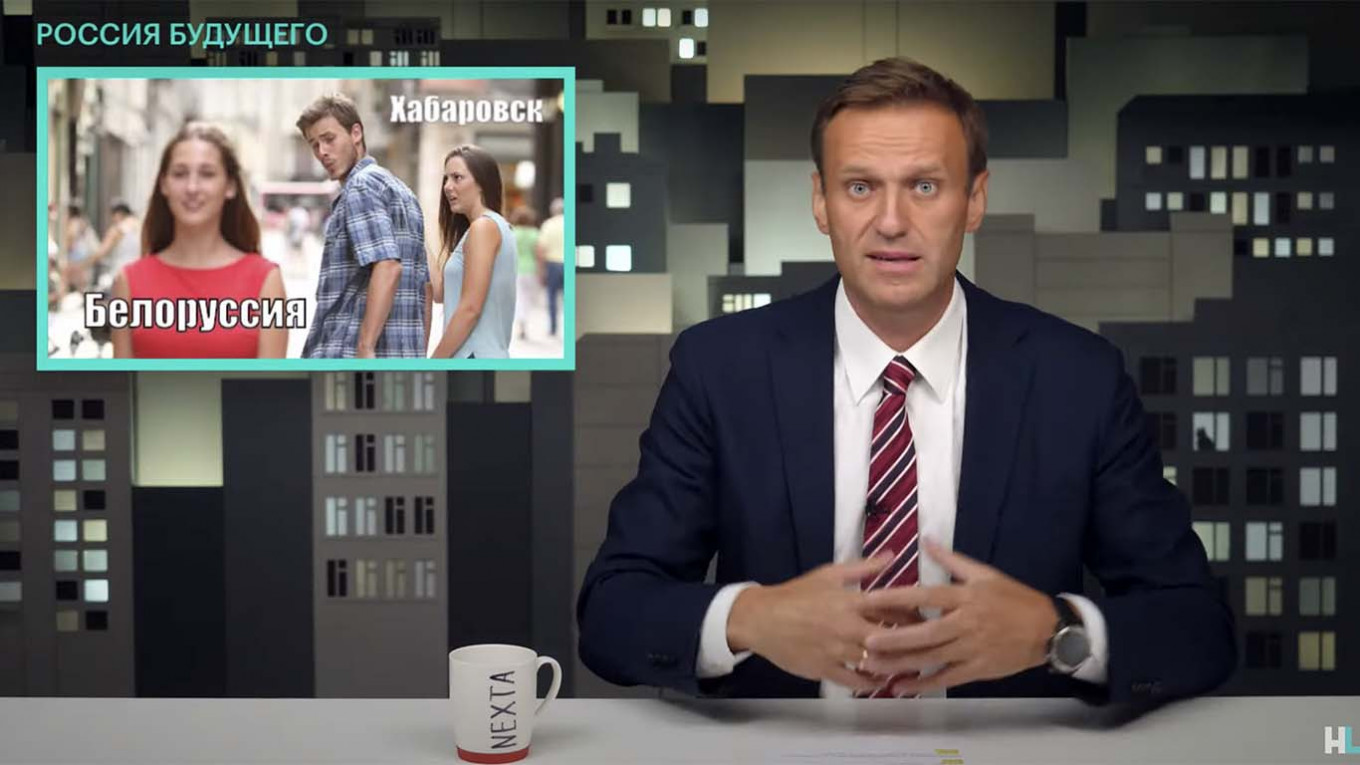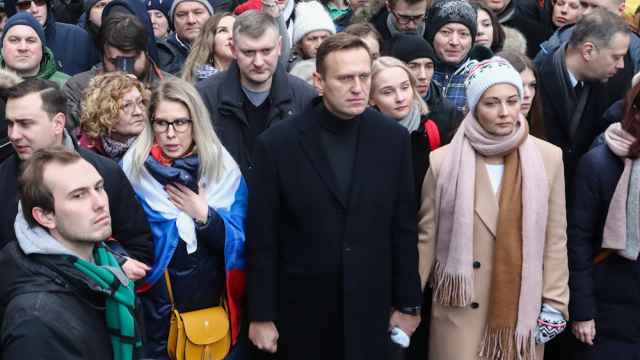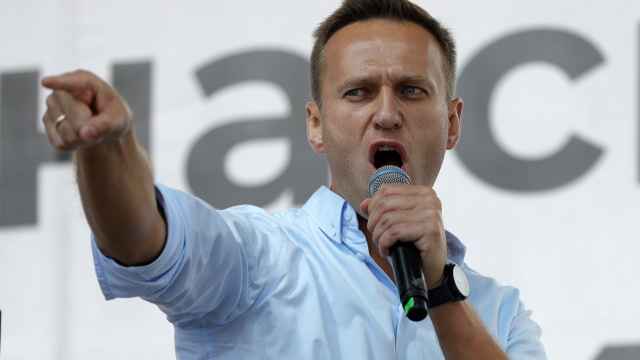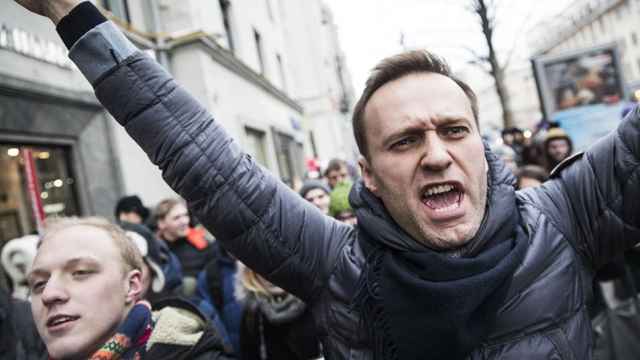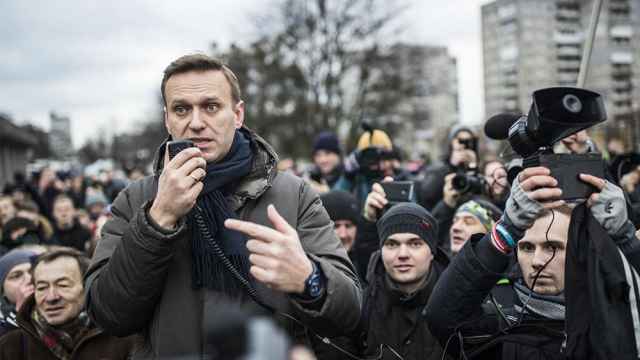During his weekly YouTube talk show Thursday, Kremlin critic Alexei Navalny summed up how Russia’s opposition feels about the protests that are raging on either end of the post-Soviet space with one of the internet’s most popular memes: the distracted boyfriend.
In the version of the meme the de facto Russian opposition leader shared, the boyfriend, who while walking hand-in-hand with his girlfriend turns to check out another woman passing in the other direction, is the opposition. The girlfriend is Khabarovsk, a city near the border with China, where massive anti-Kremlin protests have now continued for more than six weeks.
And the other woman is Belarus, where an unprecedented uprising against Alexander Lukashenko, who has ruled the country since 1994, has swung Russia’s attention all the way from the east to its western border.
“It’s a little uncomfortable for any Russian politician,” Navalny said. “Just recently any opposition politician or Russian media was saying Khabarovsk, Khabarovsk, Khabarovsk, Khabarovsk, you are the most important political development. Which is still true, but everyone’s forgotten about it and is now only talking about Belarus.”
That’s because what’s happening in Belarus — a country that shares not only a border with Russia but also a language and cultural elements — has significant implications for Russia’s own domestic political life. As protests that erupted after a presidential election last Sunday that was widely viewed as rigged in Lukashenko’s favor have pushed his regime to the brink, opposition-minded Russians have begun wondering whether the same can be repeated at home.
“The Belarus example could be contagious,” said Andrei Kolesnikov, chair of the Russian Domestic Politics program at the Carnegie Moscow Center. “It’s a danger to the Kremlin because it’s a democratic infection that could spread.”
That desire for a more democratic government is precisely what triggered protests in Khabarovsk, after residents felt their vote had been ignored when their popular governor Sergei Furgal was arrested on July 10 on several 15-year-old murder charges. Voters felt the move was politically motivated payback for their election of a politician in 2018 who did not represent the ruling United Russia party.
Tens of thousands of people have taken to the streets in the city of 600,000 each successive Saturday, with smaller rallies held every day for 39 consecutive days in a protest movement that is unprecedented for Russia. Large opposition rallies in the regions are rare, and when they take place in Moscow the Kremlin paints them as discontent among a liberal elite that is not representative of the nation as a whole.
Yet beyond small rallies in solidarity in several other Russian cities, the Khabarovsk protests have failed to trigger a wider movement, despite protesters there having stated that as their goal.
Yulia Galyamina, a Moscow municipal deputy who helped lead large protests in the capital over fair local elections last summer, doesn’t believe a nationwide protest movement is ripe, as it is in neighboring Belarus.
“I don’t think we should take to the streets right now in Moscow,” she said. “People have called for this, but a lot of people will just get detained, and that’s it. The agenda in Khabarovsk is ultimately more of a local issue.”
Galyamina, 47, is not shy when it comes to the street protest. She was one of the few opposition voices encouraging people to rally against a constitutional reform vote that ended on July 1 and handed President Vladimir Putin the opportunity to remain in office until 2036. But that demonstration in Moscow on July 15 attracted only several hundred people, over 140 of whom were detained.
Galyamina nonetheless believes that the protest mood in Russia is growing and Putin’s approval rating, which has dropped to its lowest level since he came to power in 2000, has nowhere to go but down. The Belarus scenario, she said, is several years away.
“The example of Belarus is inspiring to people because it shows that you are not helpless, that you can get out of the vicious cycle,” Galyamina said. “A lot of people are against what’s happening in our country but don’t feel we can do anything about it.”
The fact that Russians are so interested in what’s happening in Belarus, a similar country with a similar governing structure, Galyamina added, underscores that people in Russia do want change.
One indicator of that interest is the Belarusian Nexta Live channel on the Telegram messaging app. Since the beginning of the protests, the channel, which posts a constant stream of updates, has become the most popular Telegram channel in the Russian language with 2.2 million subscribers and counting.
Still, Galyamina said, “the Belarus example also shows that the opposition can call for people to come out, but it will be the people that decide.”
Street protests may nonetheless be on the horizon for Russia. In his show, Navalny, who has organized some of the largest rallies in Moscow in recent years, said the Belarus example shows that participating in elections is important, but only if people also take to the streets.
“In response to injustice, you go and defend your rights,” Navalny said. “That’s the key lesson of Belarus.”
As Kremlin watchers begin to speculate over whether Putin will intervene in Belarus to protect Russia’s interests, Tatiana Stanovaya, founder of the R.Politik analysis project, said that the Russian authorities are also taking stock of what’s happening next door when it comes to their own domestic politics.
“The Belarus factor increases the political risks inside Russia,” she said. “It’s being taken as an added destabilizing threat.”
The authorities, Stanovaya said, will try to ensure they avoid moves that may lead to mass protests. But she added that they’ve also lost the understanding of what might trigger that. One recent move that political analysts say the Kremlin didn’t expect to spark such widespread discontent? Removing Furgal from his post in Khabarovsk.
“They don’t have the feeling at their fingertips of what’s happening with the people,” she said. “So they will be doing this practically blind.”
Alexander Baunov, a senior fellow at the Carnegie Moscow Center, said events in Belarus will also confirm to Putin that an earlier transition of power is better than waiting until the last moment. Baunov has argued that Putin’s move to give himself another two possible presidential terms was more about giving him a chance to maneuver than to ensure that he will rule for another 16 years.
“Putin understands that 20 years is close to the limit,” Baunov said. “I still think this transition will happen in 2024 or earlier.”
A Message from The Moscow Times:
Dear readers,
We are facing unprecedented challenges. Russia's Prosecutor General's Office has designated The Moscow Times as an "undesirable" organization, criminalizing our work and putting our staff at risk of prosecution. This follows our earlier unjust labeling as a "foreign agent."
These actions are direct attempts to silence independent journalism in Russia. The authorities claim our work "discredits the decisions of the Russian leadership." We see things differently: we strive to provide accurate, unbiased reporting on Russia.
We, the journalists of The Moscow Times, refuse to be silenced. But to continue our work, we need your help.
Your support, no matter how small, makes a world of difference. If you can, please support us monthly starting from just $2. It's quick to set up, and every contribution makes a significant impact.
By supporting The Moscow Times, you're defending open, independent journalism in the face of repression. Thank you for standing with us.
Remind me later.



